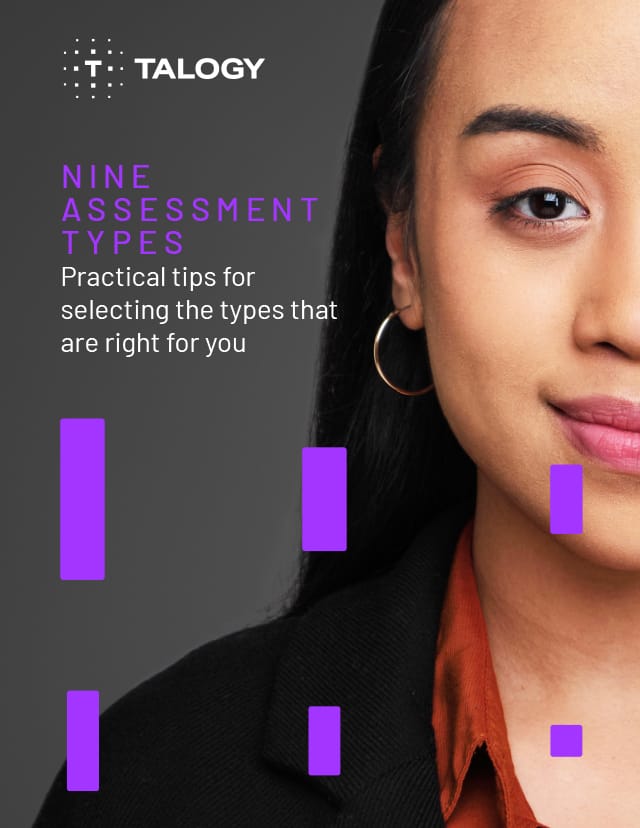Written by Jaclyn Menendez, Ph.D., Project Consultant
In today’s competitive work environment, effective internal promotion processes are key to keeping employees engaged. Yet, many companies skip a structured approach to promoting talent. In the same way that assessments are a crucial step in the hiring process, they’re just as important in a company’s promotion process. In this blog, we’ll dive into why using selection and promotion assessments is vital for justifying promotions and making sure the right candidates step into leadership roles.
Reflecting on your selection and promotion processes
Here’s a quick activity: Think about the words you’d use to describe your selection process. Reflect on the objectivity, the lengths you’ve taken to ensure legal defensibility, and the overall careful thought that your organization has put into it.
Now, think about your promotion process. Would you use the same words?
Odds are, the answer is no. The research and literature regarding promotion processes and procedures are woefully lacking, which is a disappointing but accurate reflection of how most organizations approach internal promotions and the overall selection and promotion process. In theory, this absence of rigor makes sense. When hiring new employees, assessments are vital because you lack past performance data. But when it comes to internal promotions, you’ve already seen what that person is capable of. As long as you have objective criteria for the new role, and someone in mind who seems like a great fit, you should be all set – right?
Wrong. While this all sounds logical in theory, the reality is your promotion process requires the same level of rigor and attention as your selection process.
How assessments benefit your promotion process
You should be proud of your robust selection system, but just as you ensure a fair and comprehensive evaluation for new hires, it’s essential to extend that same attention to your promotions. Here’s how implementing assessments can benefit your promotion process:
Past performance doesn’t guarantee future success
One of the most common mistakes with internal promotions is when a star employee gets promoted based solely on their previous role. Just because someone excelled as an individual contributor doesn’t mean they’ll thrive in a leadership position. Often times, the role that you’re promoting someone into is fairly different from the role they were in and may require a different set of skills, especially at a leadership level.
For example, you may have extensive performance data on an employee’s attention to detail or strong work ethic, but have you ever observed them in a coaching setting or situations that required team-leading in some capacity? If the new role requires skills you haven’t had the chance to evaluate, you’re basically going in blind. A promotion assessment can provide critical insights into how well the employee will handle their new responsibilities.
Bias can cloud your judgment
When deciding on employee promotions, you’re likely going to be biased, either positively or negatively. Unlike the hiring process, where you can remain objective on new employees, promoting a current employee or fellow co-worker often brings personal feelings into play, and you’re much more likely to ‘go with your gut’ when it comes to justifying a promotion. In some cases, this may prejudice you against the candidate (maybe they aren’t very friendly to you, or you had a negative experience working on a project in the past with them), and in other times it may unfairly endear them to you (they always bring in donuts on Fridays, or their child goes to the same school as yours). Either way, this information is not relevant to the job in question and is therefore introducing error into your promotion decision.
Using employee assessments can help you establish a baseline for each candidate’s strengths and weaknesses. By measuring them against a common standard, you can ensure a more objective evaluation, ultimately making it easier to justify a promotion. When you can back up your decision with data and insights, it becomes easier to defend your choices to stakeholders.
Types of selection and promotion assessments
Assessments are invaluable tools that can help you make informed decisions about promotions. Here are a few types to consider:
- Cognitive ability tests: These types of tests can provide a clear indication of the employee’s growth potential. Talogy’s Mindgage assessments can help measure problem-solving skills and critical thinking, essential for most leadership roles.
- Personality assessments: Understanding a candidate’s personality traits using a personality assessment can help predict how they will fit into a leadership role and interact with team members.
- Situational judgment tests: These tests present candidates with hypothetical scenarios relevant to the new role, assessing their judgment and decision-making skills.
By implementing rigorous evaluation methods, organizations can not only improve the likelihood of successful internal promotions, but also instill a culture of fairness and transparency. Remember, your employees deserve the best – give them a promotion process that reflects that commitment.
The power of assessments in internal promotions
Promoting from within is a fantastic way to recognize talent and foster loyalty, but it must be handled with the same care as hiring. Embrace assessments as a vital part of your promotion process which will help to ensure your organization continues to thrive. After all, the success of your organization often depends on how well you manage talent internally.




